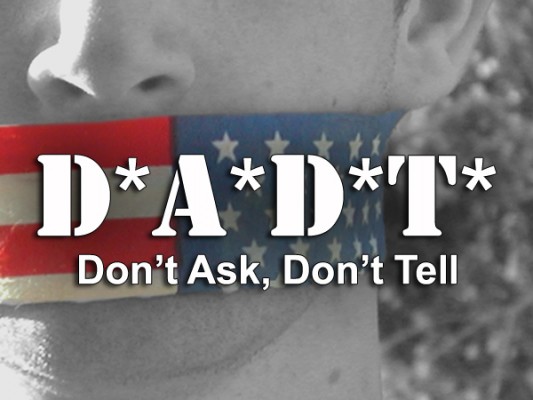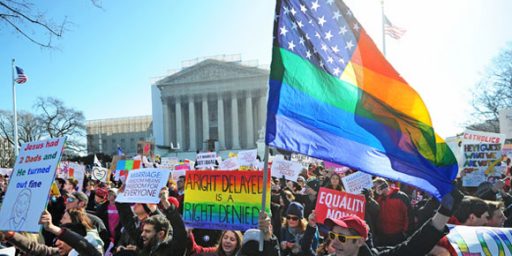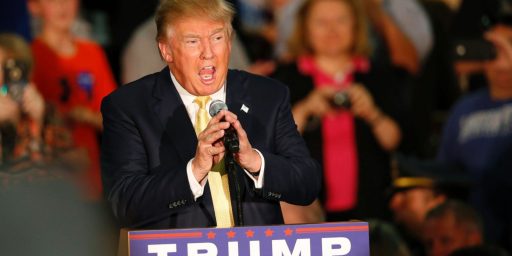The Politics of Gays in the Military
In response to my assertion that gays in the military is “still a hot button issue in much of the country,” both Andrew Sullivan and commenter JB cite a new CNN poll showing 78 percent of the public supports changing current policy.
Andrew asserts that the belief that this remains controversial is a function of media hype and the domination of the military by “Christianist thinking” but that it “will almost certainly be a total non-event.” Perhaps.
If one looks at the poll report, one sees this result has been virtually unchanged since December 2003. But, as noted in my original post, “Referenda to ban gay marriage, for example, seem almost always to pass easily.”
At least three possible explanations obtain.
First, people are more passionate about gay marriage than gays in the military.
Second, people are lying to pollsters about their views on gays in the military, in a variation of the so-called Bradley Effect, or what pollsters term the “social desirability bias.”
Third, the issue is much more salient for the 22 percent who oppose gays in the military than the 78 percent who favor.
My guess is a combination of the three, with the third being the most powerful explainer. While I’ve come to support removing the ban in recent years, it’s not something that I’m likely to march in the streets over. Or even to change my vote on a political candidate over. It’s an intellectual position that I hold, not something about which I’m overly passionate. But Sullivan’s “Christianists” and a lot of old school soldiers are passionate over this issue, just as they were in 1993.







Ah, but maybe 22% of the 78% percent are passionate about it too…
Although, to be honest, the 78% is a little suspicious. Sure, you’d get a number in the high seventies if you polled something as innocuous as “Are babies cute?” But for something like gays in the military, it intuitively feels like it would be a little more contentious.
The question is combat effectiveness and the possible impact on the fighting force overall. Let the soldiers and service people themselves tell us whether they would feel comfortable with this. Maybe practicality can trump Political Correctness, at least in this one instance. Don’t make our armed services any more of a grounds for social engineering experiments than they already are.
I don’t see why this is different than when women were integrated or desegregation occurred. There will be problems which will be addressed by the chain of command; the armed forces will not fall apart and they will be the professional fighting force that they always are. The armed forces know how to handle changes that the civilian leadership imposes that they may or may not like.
Juneau,
So far we’ve gotten statements from the current CJCS, two former CJCS’s, the Secretary of Defense, and many others with military experience saying it’s time to lift DADT.
As for this being a “social engineering experiment,” the evidence from nations like England, Australia, and Israel, all of which allow gays to serve openly in the military, is fairly conclusive that this is far less of a problem than opponents make it out to be.
A couple of thoughts:
1. That gay marriage referrenda pass while only a ~25-30% minority support DADT isn’t at all surprising — it is exactly what polling data show (not just the new CNN poll but any polls of the last couple of years). Polls clearly show that opinions on the two issues are quite distinct, so why cite gay marriage point as evidence that DADT is a close political split?
2. What’s the evidence for a Bradley effect? We have pre-election polling data on the gay marriage referrenda and to my knowledge they don’t show significant misrepresentation relative to election outcomes. The measure in CA did a bit better than polls since likely voter screens understated the number of blacks who ended up voting (African-Americans were quite likely to support the measure), but that’s different. Political scientists have looked and as far as I know they haven’t found an effect on the gay marriage issue, so I’m not sure why James proposes one on DADT.
3. For Juneau, I work with mid-level officers every day, and they consistently do not see DADT repeal as a big deal. I can’t find many who worry about combat effectivness, and I had a whole room full of majors and lt. commanders burst out laughing when I asked whether they thought servicemembers would resign or fail to re-enlist over it. I’ve found a few strongly opposed, but for every one who is there is one who is outspoken for repeal. I don’t think I’m only hearing this because I’m inclined towards repeal; I’ve also heard older ex-miltary colleagues who do oppose gay service complaining that today’s officers just don’t care about it anymore.
4. Again semantics. No doubt there is a small minority that cares a lot, and, that group is probably more likely to vote than average, more wealthy/connected than average, and is concentrated regionally (i.e., some states are 55-45, some 80-20, not all the national average). I’d agree with James that means that this will generate political heat, no doubt. I disagree with the suggestion that DADT repeal will look like ramming through health care on a close political divide, or like trying to push through national gay marriage would like. DADT is way easier than those.
milprof:
Agree with most of that. My sense that this is a hot button issue is prompted by a pretty simple observation: Despite widespread support in the polls over time, presidents and Congress have been extremely reluctant to move on this issue. That means they either disagree with the public or somehow think they’re likely to suffer political consequences.
Most 30-something officers are likely past this issue and most of the older guys are likely tired of fighting a losing battle.
My guess is that this passes, since I don’t see Republicans engaging in a filibuster. But it appears to be far from a slam dunk.
Greetings:
A while back, there was an article on the American Thinker website by a guy named Bernard, if I remember correctly. His analysis of DADT was based on what he referred to as society’s “sexualized zones”, its “non-sexualized zones” and the importance of social taboos. It was an analysis that addressed the homosex which is something that most such writers seem much determined to avoid.
As to the potential results of allowing homosexuals to serve “openly”, I would recommend that those interested (adults only please) google the “Up Your Alley Fair” as an outcome to another polity’s allowing homosexuals to serve “openly”.
Lastly, much akin to homosexual marriage, we again see a tiny minority of a tiny minority being allowed to restructure a major societal institution to fit their sexual disorientation.
To many the concept of “to serve openly” is misunderstood, ref 11B40. What does it mean to serve openly? Tutus and such? No hardly! What it means is that the hostile environment toward gays, lesbians and bisexuals would no longer exist, that they would not have to guard their thoughts and thei speech. In a career where hostilty is an occupational hazard, additional hostility is unwarranted.
Fears of rappant rape, sexual harassment and other sexual misconduct are not sufficent to justify maintaining an environment that serves only to feed those fears. Like integration of blacks and women into the armed forces this too will be accepted with little problem.
It’s a “hot button issue” to the degree that a certain political party makes it a hot button issue in order to stir up their base. When you compare DADT with SSM, how can you not notice the tens of millions of dollars ponied up by the Catholic Church, the Mormons, and the Southern Baptists to inflame the public with worries about “the children”?
Oh, and stop talking about referenda that ban SSM. They mostly ban SSM and civil unions, despite the fact that the majority of the public supports (at least) civil unions for gay people. How to explain the winning referenda? See “inflame” above.